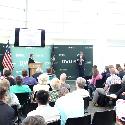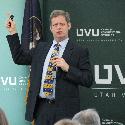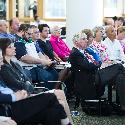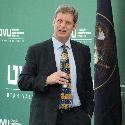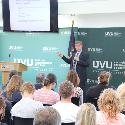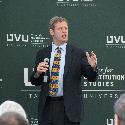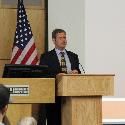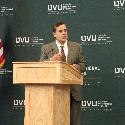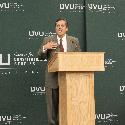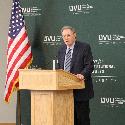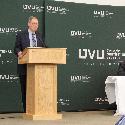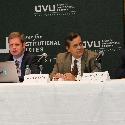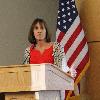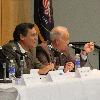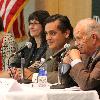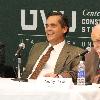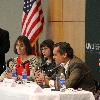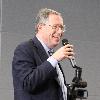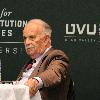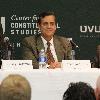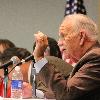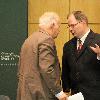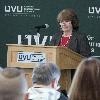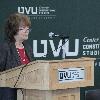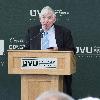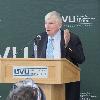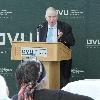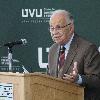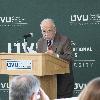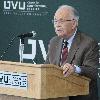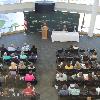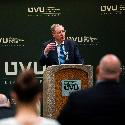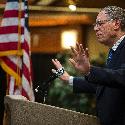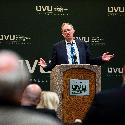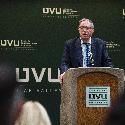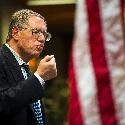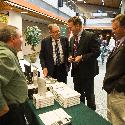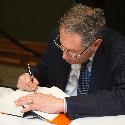"You Can't Say That Anymore." Real and Perceived Limitations on Speech in 21st Century America
Opening Address: Freedom of Speech and Anti-Discrimination Law
- Eugene Volokh | Gary T. Schwarz Professor of Law at the University of California, Los Angeles
Eugene Volokh opened the conference by addressing the effects of anti-discrimination law on speech. While he admits that, much of the time, antidiscrimination law poses no free speech problems, sometimes it does. Most significantly, “hostile environment harassment” can restrict even otherwise protected speech in workplaces, universities, and places of public accommodation. Volokh also notes that bans on discrimination in hiring affect filmmakers’ ability to choose whom to cast in what roles and that religious accommodation laws have the potential to pressure employers to restrict speech. What do we do? While “lines are often hard to draw,” Volokh warns that these issues must be addressed; otherwise the legal system will be ill-prepared to resolve future clashes between the First Amendment and anti-discrimination laws.
Panel: When Free Speech and Equality Collide in the Work Place
- The Oldest Form of Employment Anti-discrimination Law | Eugene Volokh, Gary T. Schwarz Professor of Law at the University of California, Los Angeles
- The Rise of Little Brother: How Employment and Contractual Conditions are Eroding Free Speech in the 21st Century | Jonathan Turley, Professor of Law, George Washington University
- Collective Bargaining and Political Speech: Dissonance in the Public Sector Unions | Richard Epstein, the Laurence A. Tisch Professor of Law at New York University Law School
This distinguished panel of legal experts addressed free speech issues in the work place. Eugene Volokh led out the discussion, this time addressing, “The Oldest Form of Employment Anti-discrimination Law.” Taking some by surprise, Professor Volokh argues that the oldest form of employment anti-discrimination law is not related to race, religion, or union membership, but rather the law banning discrimination based on political activity. After explaining how the states in the 19th century banned employers from threatening to fire or actually firing their employees due to how they voted in an election, Volokh declares that today all 50 states ban discrimination based on voting activity, and about half of the states ban discrimination based on other kinds of political activity.
Jonathan Turley, Professor of Law at George Washington University, then spoke on, “The Rise of Little Brother: How Employment and Contractual Conditions are Eroding Free Speech in the 21st Century.” Turley notes that when corporations or businesses discriminate against certain unpopular or offensive speech, it causes a “chilling effect” on employee speech because people won’t say certain things for fear that they might be punished. These non-governmental intrusions are becoming more and more common, leaving Professor Turley, and the American public, to ask the question: “What is offensive, and who makes that decision?”
The final panelist to address this timely topic was Richard Epstein, Professor of Law at New York University, who spoke on “Collective Bargaining and Political Speech: Dissonance in the Public Sector Unions.” Epstein examines Abood v. Detroit Board of Education (1977), noting that the U.S. Supreme Court fashioned a compromise that required unions to allow employees who were opposed to the unions’ political agenda to opt out of contributions. After addressing whether Abood was sound or flawed at birth, Epstein reveals that the decision has come under recent attack in two important cases: Knox v. SEIU (2011) and Harris v. Quinn (2014), which now places the Supreme Court’s initial Abood compromise in doubt. "The long question of history,” Epstein concludes, “[is what should we do] with public employment and unionization” in light of these three decisions.
Panel: The Media and Free Speech
- The U.S. Media’s Failure to Cover the Greatest Data Privacy Breach in U.S. History and Its Chilling Effect on Patients’ Speech | Deborah Peel, M.D., Physician and Freudian Psychoanalyst, Founder of Patient Privacy Rights
- New Media, Old Media, Social Media, and Public Debates Over Free Speech | Lindsay Hoffman, Associate Professor, Department of Communication and Department of Political Science & International Relations, University of Delaware
- The Voldemort Factor: The Role of Language In The Shaping of Public Debates and Those Words That Must Not Be Named | Jonathan Turley, Professor of Law, George Washington University
- Additional closing remarks by Stanley Fish, New York Times Columnist, and Davidson-Kahn Distinguished Professor of Humanities and Law at The Florida International University
Dr. Deborah Peel, a medical practitioner and psychoanalyst best known for patient advocacy, opened the panel discussion speaking on what she calls “the most valuable personal data in the digital age.” She discussed the Health Insurance Portability and Accountability Act of 1996 (HIPAA), and how it eliminated patients’ rights to control personal health information in 2002. Peel says that HIPAA destroys privacy instead of protecting it, and that privacy rights under the Constitution, state and federal laws, and the ethical codes of health professions are not being protected. She argues that these violated rights make the most compelling case that health data should have fair information practices (FIPs) and tough new data privacy and security protections. In particular, she notes that the media’s failure to cover these privacy concerns is having a chilling effect on patients’ communications with their health care professionals. “To protect their privacy,” Peel laments, “there are huge numbers of Americans…who avoid and delay treatment for very serious conditions…We now have a medical record system that causes sick people to stay away from doctors.”
Lindsay Hoffman examined how the First Amendment applies to a new media environment through a social and historical lens. She informs us that regulation of free speech has been long discussed in this country. Additionally, she reveals that the development of newspapers, radio, and television were each accompanied by lively debates on what should and shouldn’t be said in these forums. Since its inception, the Internet has also drawn such concerns. Hoffman asks: “What does free speech look like in the new media era? Is it possible to have free speech without over-regulating the Internet? What types of speech should be regulated, if any?” She argues that the internet “has truly brought to light the conflict between our ideals of free expression and regulation.” She further states: “We don’t really know how to balance these two things, so what will free speech look like in the new media era, and might it be impossible without extensive regulation?”
Jonathan Turley, a legal and media expert, analyzed what he refers to as “The Voldemort Factor.” He relates that, in politics, media, and academia, there is an ever-lengthening list of words that are being banned as insulting or offensive. While he recognizes that part of this trend is understandable and commendable, the other part appears outcome-determinative. For example, some would bar the use of the term “illegal aliens” to remove the unlawful status reference of an individual in favor of the term “undocumented persons.” Banned words are sometimes viewed as forcing other groups to use neutral or non-descriptive terms that appear to reinforce the opposing views. Turley opines that the difficult line to draw is how the media should respond when one group finds a term offensive but others do not. He further states that the current trend is to remove any and all words that would be viewed as offensive even to a small minority, joking that some words are the equivalent of “Voldemort verbiage” that “shall not be named.” Turley’s question is whether we are adopting a standard of prohibition that is too easily satisfied or too responsive to insular groups. He concludes that there has not been adequate public debate on how the media should respond when one group finds a term offensive but others do not, or who should be the ultimate authority on these sensitive issues.
New York Times columnist and well-known professor, Stanley Fish, followed these remarks with added insights. His disagreement with some of the presenters’ conclusions led into an energetic Q&A session, that included an aggressive debate between Professors Turley and Fish, some input from Drs. Peel and Hoffman, and even some passionate comments from Richard Epstein, who was seated in the audience.
Panel: Academic Freedom and The Modern Professor
- Contemporary Challenges to Academic Freedom | Barbara Lee, Professor and Chair, Department of Human Resource Management, Rutgers University
- Is Academic Freedom a Narrow or an Expansive Concept | Stanley Fish, New York Times Columnist, and Davidson-Kahn Distinguished Professor of Humanities and Law at The Florida International University
- Free Expression and Social Media in Cyberspace | Robert O'Neil, Former President and Professor of Law Emeritus and University Professor Emeritus at The University of Virginia
Barbara Lee, a distinguished professor and law textbook author, began this panel discussing “Contemporary Challenges to Academic Freedom.” She voices her concern that the dividing line between individual academic freedom and institutional academic freedom has never been less clear, and that traditional notions of academic freedom are increasingly clashing with diversity, inclusiveness, and the concerns of survivors of violence. She further examines this concern with a reference to the Supreme Court’s decision in the Garcetti Case (2006). She opines that it has persuaded some federal courts to rule that most types of faculty speech do not merit First Amendment protection. Lee believes that we need a “national conversation on the new realities of education and academic freedom that recognizes its centrality, responds to its challenges, and reflects the reality of the environment we now face.” Due to increasing pressure from legislators and interest groups to monitor or even limit what is taught in the classroom, she asks, “Are traditional notions of academic freedom sufficient to respond to these external pressures?”
Stanley Fish addressed the balancing act academics must perform in his lecture titled, “Is Academic Freedom a Narrow or an Expansive Concept?” Utilizing his background as a writer, he addresses the phrase “academic freedom,” and opines that if the weight falls on the adjective “academic,” the freedom claimed is quite narrow and limited, but if the word “freedom” is highlighted, the claim is much larger and extends to licensing academics to do and say whatever they think is right and good. Fish asks the question: “Are academic professionals entitled only to the latitude necessary to perform the tasks for which they are trained and paid? Or are academics society's watchdogs and whistleblowers, authorized to speak truth to power wherever power has been illegitimately exercised by a state or by a court or by the administrations of their own universities?” His answer: “Although as an academic, some of the speech you produce is commissioned and created by your employer…with respect to some other forms of speech required by your official duties, your commission is not to be faithful to authority and settled wisdom, but to go beyond them.”
Former President of UVA, Robert O’Neil, concluded this panel session with his remarks regarding “Free Expression and Social Media in Cyberspace.” He bases his examination on the “Academic Freedom and Electronic Communications” report by the American Association of University Professors. This report outlines a series of basic principles governing regulation of faculty and student expression in digital form. The report addresses the tension between access and privacy on one hand, and security and access on the other, urging a crucial faculty role in shaping applicable policies. He adds that a new section of this report recognizes the burgeoning importance of social media, and describes conflicts that are just beginning to emerge in the courts. O’Neil references a developing debate regarding the controversial tweets of a university professor, and poses the question: “What difference does it make or should it make that one medium of communication is fundamentally different from others?” He concludes that “social media sites blur the distinction between private and public information in new ways,” and that the courts and most university policies have yet to fully address many of the conflicts emerging from a new social media landscape.
Constitution Day Address: Our Classical Liberal Constitution: How Liberty and Equality Can Best Coexist
- Richard Epstein, Laurence A. Tisch Professor of Law at New York University Law School
Richard Epstein closed the conference with a remarkable address in which he examined the interaction between the notions of liberty and equality under two conceptions of the Constitution. Of the two models he references, the first posits a small government with strong contract and property rights, and the second posits a large government that uses administrative agencies and general mandates to regulate markets in such areas as employment, land use and religion. Epstein’s central thesis is that it is far easier to accommodate the notions of equality and opportunity in a classical liberal state than it is to accommodate any notion of liberty in a state that is dedicated to equality of outcomes, and in which extensive regulation is regarded as the norm. One key illustration of his point is the interaction between the free exercise and establishment clauses of the First Amendment under these two theories.
Professor Epstein’s conclusion is that “if you reduce the productive base by putting these orders in place, you cannot support the transfer economy that you wish to have on top of it. And so the kind of performance that we have had in the United States…is a reflection of the fact that the progressive vision which had won constitutionally now seems to have won politically, and the purpose [of my writing] is to see if one can reduce the intellectual climate so as to undo what I regard as systematic mistakes. These are not simply marginal errors, they are not calculation errors; they are fundamental errors of political structure. And, in the progressive tradition, all of them, whether you are dealing with standing, taxation, commerce powers, or individual rights, they have got everything precisely backwards.”
Following his address, Professor signed copies of his new book from Harvard University Press, The Classical Liberal Constitution: The Uncertain Quest for Limited Government.


